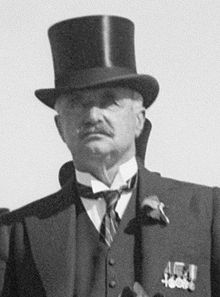William Wellesley Peel
|
The Right Honourable The Earl Peel GCSI GBE TD PC |
|
|---|---|
 |
|
| Chancellor of the Duchy of Lancaster | |
|
In office 1 April 1921 – 19 March 1922 |
|
| Monarch | George V |
| Prime Minister | David Lloyd George |
| Preceded by | The Earl of Crawford |
| Succeeded by | William Sutherland |
| Secretary of State for India | |
|
In office 19 March 1922 – 22 January 1924 |
|
| Monarch | George V |
| Prime Minister |
David Lloyd George Bonar Law Stanley Baldwin |
| Preceded by | Hon. Edwin Samuel Montagu |
| Succeeded by | The Lord Olivier |
|
In office 18 October 1928 – 4 June 1929 |
|
| Monarch | George V |
| Prime Minister | Stanley Baldwin |
| Preceded by | The Earl of Birkenhead |
| Succeeded by | William Wedgwood Benn |
| Personal details | |
| Born |
7 January 1867 London |
| Died |
28 September 1937 (aged 70) East Meon, near Petersfield, Hampshire |
| Nationality | British |
| Political party |
Liberal Unionist Conservative |
| Spouse(s) | Hon. Eleanor Williamson |
| Alma mater | Balliol College, Oxford |
William Robert Wellesley Peel, 1st Earl Peel GCSI GBE TD PC (7 January 1867 – 28 September 1937), known as The Viscount Peel from 1912 to 1929, was a British politician.
The eldest son of Arthur Wellesley Peel, 1st Viscount Peel and Adelaide Dugdale, Peel was born in London in 1867. His father was the fifth and youngest son of Prime Minister Sir Robert Peel. He was educated at Harrow and Balliol College, Oxford, where he was secretary of the Oxford Union. In 1893 he was called to the bar at the Inner Temple, and practised as a barrister before taking the position of special correspondent for the Daily Telegraph during the Greco-Turkish War of 1897.
In 1900 Peel was appointed a member of the Royal Commission formed to inquire into the operation of the Port of London. In February the same year he began his political career when he was elected in a by-election to fill a vacant seat for Woolwich in the London County Council, to which he was re-elected in the ordinary election the following year. He was a member of the pro-Conservative grouping on the council that became the Municipal Reform Party. He was leader of the Party from 1908 to 1910 and chairman of the county council from 1914 to 1916. He begun his Parliamentary career when he was elected as Liberal Unionist MP for Manchester South at a by-election. At the next general election in 1906 he stood unsuccessfully at Harrow. He returned to the Commons in 1909, when elected as Conservative MP for Taunton at a by-election. He inherited his father's viscountcy in 1912, and moved to the House of Lords.
...
Wikipedia
